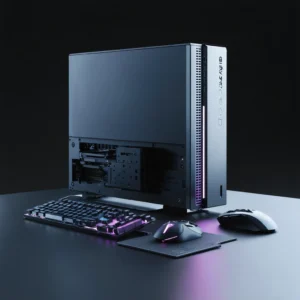
Introduction to Adapt X and the Evolution of Modular Laptops
The technological landscape is witnessing an unprecedented transformation with the advent of modular computing solutions that emphasize sustainability and longevity. Among the frontrunners, Compal Adapt X emerges as a revolutionary concept that seeks to redefine how laptops are built, maintained, and evolved over time. Tailored for business users and tech enthusiasts alike, Adapt X is designed to counter electronic waste by allowing users to upgrade or replace essential components independently, thus extending the device’s lifecycle and reducing overall environmental impact.
Core Features of Adapt X
Modular Design and Replaceable Components
One of the key innovations behind Adapt X is its fully modular architecture. This approach ensures that instead of discarding an entire device due to component obsolescence, individual elements can be upgraded or replaced. Some of the prominent features include:
- Fully Replaceable Components: Users can swap out key components like the CPU, GPU, storage, and memory, catering to evolving performance demands.
- Detachable Secondary Display: The unit includes an auxiliary display that can serve as an extended workspace, ideal for multitasking and professional productivity.
- Ultra-thin, Detachable Keyboard: Mimicking the usability of a tablet without sacrificing performance, the keyboard ensures versatility in usage.
- Type-C and Functional HUB: Equipped with modern Type-C interfaces and a customized HUB system, Adapt X offers an array of input/output options, making it suitable for a wide range of connectivity needs.
Business-Oriented Enhancements
Adapt X is engineered to meet the demands of professional environments, helping businesses reduce cost and waste while maintaining high performance:
- Cost Efficiency: The modular ecosystem allows organizations to upgrade components selectively, lowering overall IT expenditure.
- Enhanced Productivity: With its detachable secondary display, multitasking becomes seamless, enabling professionals to manage multiple applications simultaneously.
- Durability and Sustainability: Designed to be upgradable, Adapt X fosters a sustainable computing model that minimizes the need for frequent device replacements.
Innovative Technologies and Performance Attributes
Modular AI Integration and Functional HUB
The heart of Adapt X’s innovation lies in its integration with Modular AI and a dynamic functional HUB, which collectively allow for tailored performance adjustments. This modular AI approach facilitates:
- Customized Performance: Users can choose AI modules that best fit their operational needs, whether for data processing or visual display enhancement.
- Scalable Processing Power: By decoupling the AI components from the base system, the device can adapt to increasingly demanding software environments without a complete overhaul.
- Streamlined Connectivity: The HUB expands the overall utility of the laptop, incorporating additional ports and connectivity options. This is especially useful for professionals who frequently switch between multiple devices.
Design Excellence and Recognition
Adapt X has not only attracted attention from tech enthusiasts but also from design experts. Its metallic aesthetics, combined with an innovative engineering approach, has been acknowledged by prestigious awards such as the iF Design Award for 2025. The device embodies a combination of design sophistication and practical functionality that is essential for modern business environments.
Sustainability and Extended Usability in Modern Computing
Reducing Electronic Waste
The modular design of Adapt X directly addresses the growing concern over electronic waste (e-waste) by enabling users to replace only the components that no longer meet their needs. This approach stands in contrast to traditional devices where the failure of a single component renders the entire system obsolete. The benefits of such a model include:
- Environmental Impact: Reducing waste by prolonging device life cycles is crucial in today’s eco-conscious market.
- Resource Optimization: With replaceable parts, manufacturers and consumers alike can reduce the demand for new raw materials.
- Economic Advantages: Both businesses and individual users benefit from lower maintenance and upgrade costs, as the modular system minimizes the need for full device overhauls.
Adaptability Across Industries
The flexibility of the Adapt X design makes it an ideal candidate for numerous business applications. Its scalable structure is well-suited for sectors such as trading, programming, and general office use:
- Trading Platforms: The dual-display capability ensures that financial professionals can monitor multiple market variables in real-time.
- Software Development: Developers appreciate the customizable hardware setup, which can be adapted as their project requirements evolve.
- Corporate Environments: Enterprises can benefit from a streamlined computing infrastructure that is easier to maintain and upgrade over years of operation.
Practical Implementation and Future Perspectives
Steps Towards Full Realization of the Modular Concept
Integrating a modular approach into mainstream devices involves a series of well-planned steps that ensure reliability and user-friendliness. To seamlessly transition to a world of modular computing, manufacturers could consider the following implementation roadmap:
| Phase | Description | Expected Outcome |
|---|---|---|
| Concept Development | Design and prototype various modular components to test compatibility and performance. | Validated modular framework and early generation prototype. |
| Market Testing | Engage with early adopters and business partners in pilot trials. | Feedback-driven adjustments and optimization. |
| Production Scaling | Implement streamlined manufacturing processes to support modular integrations. | Enhanced production efficiency with reduced time-to-market. |
| Post-launch Upgrades | Establish a continuous upgrade ecosystem for component enhancements. | Sustained performance longevity and consumer satisfaction. |
Future Trends and Industry Impact
Looking ahead, the principles demonstrated by Adapt X could revolutionize the design and deployment of technology across various sectors. As trends shift toward sustainable and customizable solutions, this modular approach might become a standard rather than a niche concept:
- Consumer Empowerment: Users will have greater control over the performance and longevity of their devices.
- Innovation in AI Modules: Future iterations of modular AI components may incorporate more advanced functionalities, such as real-time analytics and enhanced connectivity capabilities.
- Industry-Wide Adoption: The success of modular designs like Adapt X could inspire broader industry changes, prompting competitors to explore similar sustainable technologies.
In conclusion, Adapt X represents a significant leap towards an era where technology is no longer disposable but is instead defined by its ability to evolve and adapt to users’ needs. By embracing a modular design that supports replaceable components, innovative connectivity solutions, and AI-driven enhancements, this concept laptop paves the way for sustainable computing models in the future. It not only addresses modern challenges like electronic waste and hardware obsolescence but also sets a blueprint for the next generation of business laptops—a future where devices remain perpetually relevant through continuous evolution. As companies and consumers alike seek to balance performance and sustainability, Adapt X stands as a testament to the potential inherent in rethinking how we design and enjoy our technology.
The holistic approach of Adapt X, with its blend of aesthetic excellence and functional pragmatism, provides a glimpse into the future of computing. In an industry where rapid technological change often leads to premature obsolescence, this innovative modular design offers a refreshing alternative that prioritizes longevity, cost efficiency, and environmental responsibility. With rapid advancements in AI and a keen focus on modularity, the future of personal computing is set to become not only smarter but also more sustainable.







